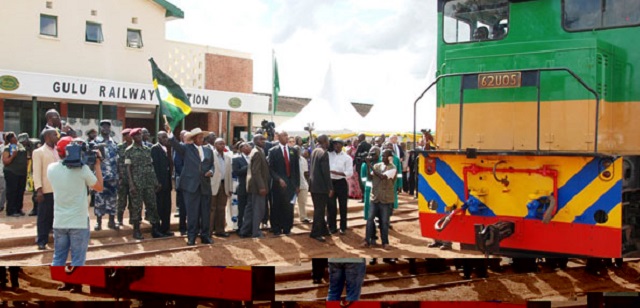
Why 30 years later, we should not condemn but sympathise with the president’s fanciful and failed dreams
THE LAST WORD | ANDREW MWENDA | Last week someone sent me a video of President Yoweri Museveni speaking on December 22, 1988.
In it, the President who was just two years in power says: “We must have our own capacity to build houses, roads, dams, railways.”
Museveni boasted that he was “using the Kasese line as an opportunity to build a railways construction unit.”
Then he accused the previous government of having negotiated a loan from foreign governments worth $200 million to build a railway.
“I told our people that $200 million is a lot of money to lay these irons from here to Kasese on a firm bed… If the British could build a railway from Mombasa to Kampala in 1900, why can’t we build it ourselves in 1988?”
Museveni was only 44 years at the time and speaks with confidence and conviction. Almost 30 years later, Uganda has not built a single kilometre of rail. Instead, whatever existed of the old rail line is now moribund and Museveni has resorted to a Chinese company to build a rail line.
Museveni’s pricing too does not look good, even when the cost difference between standard and meter gauge if factored in. The rail line from Malaba to Kampala is 273km at $2 billion while from Kampala to Kasese is 381km and would have cost $426 million in 2018 prices.
Yet while this article exposes the president’s failed promises and fanciful dreams, it is not aimed at condemning or criticising him. Instead, it seeks to understand him and even sympathise with him. I hope that in understanding Museveni failure to realise his dreams, despite his ambition and 32 years in power, we can develop a better understanding of Africa’s development predicament.
Why do problems of poverty, disease, ignorance, corruption, tribalism, dictatorial rule, rigged or elections persist in Africa even as governments come and go?
Not a single government in Africa has transformed a country from a backward, poor agrarian society into a modern, affluent industrial nation.
That is regardless of how the government comes to power (military coup, popular insurrection, armed struggle, democratic elections,) or the nature of their leadership (military or civilian), its political system (military rule, one party, one man, no party, multiparty), or length of rule or the age of the president.
It is nearly 60 years since most of our nations got independence but it is hard to find a government in Africa building her on railways, dams, roads, etc. or manufacturing her own cars, mobile phone handsets, bicycles, computers, televisions or anything of significance. Across our vast continent, it is the Chinese, Indians, Arabs and Europeans building infrastructure for us.
Sub-Sahara Africa, with a population of over 900 million people has not produced a major global brand akin to Sum Sung, Hyundai, Kia and LG produced by South Korea, a peninsular of only 52 million people.
So what really is Africa’s problem? For many people, the answer is simple – bad leadership; meaning the president, ministers, bureaucrats, legislators and military officers. We are told our leaders are selfish, power hungry and corrupt. That this has led to “bad governance.”
In Uganda’s case, our problem is one man: Museveni. But Museveni is not president of Malawi, Ghana, Nigeria, Senegal, Mali, Niger, Chad, Kenya, Zambia, Gabon, Benin, Tanzania, etc. where the Chinese and other foreign firms are building everything and locals are only hired as porters.
Africa cannot have a monopoly in the production of corrupt and selfish leaders. In any case capitalism has transformed our globe by harnessing the selfishness and greed of individuals in the market. Indeed as a moral philosophy, communism is superior to capitalism because it is based on individuals seeking the collective good and yet it failed to deliver prosperity. Therefore, I do not think selfishness per se is a bad thing – unless there is a unique way it manifests in Africa that is detrimental to progress.
Secondly, we could even ask: if leaders are the transformative agents, which president of the USA, chancellor of Germany or prime minister of Denmark, Sweden, Netherlands, Norway, Belgium, Britain and France transformed those nations? I suspect the obsession with transformative leaders was born of the specific experience of East Asia. There, five nations transformed from backward, poor agrarian societies to modern, affluent industrial nations within a generation. These nations include Taiwan, Singapore, South Korea, Japan and Hong Kong.
The first three had long serving leaders during their transformative years. I think this is the cause of the leader-centric argument. Japan and Hong Kong did not have such long serving leaders, but they too transformed. I, therefore, suspect that even without Lee Kuan Yew, Singapore, if it had a government open to global integration, would have transformed within the same period it did just like Hong Kong and Japan.
This is not to say leaders do not matter at all. They do, but only within very narrow margins. What matters most is society-wide diffusion of skills, values, attitudes, and shared-mentalities. If leaders matter, it is when good leadership is diffuse across society – from the head of a family to the head of a local school, the village council upwards to the president. Such diffusion of good leadership throughout society is an asset that propels the “right” people to the top. Even in the unlucky event a poor leader gets to the top, the infrastructure below is robust enough to ensure better governance outcomes.
Like many other political upstarts and “intellectual” elites, Museveni of 1988 thought the problem of Uganda was leadership – in his case Milton Obote and Idi Amin. For Museveni the two lacked the right ideology and patriotism.
I hope experience has humbled him since his “railway unit” has not materialised. This is not to criticise him individually – because no government in Africa is building her own dams, railways and highways. It is to show a society-wide incapacity to build things by ourselves – even after 60 years of Uhuru.
This leads me to the conclusion that Western and East Asian nations are not successful because of their political leaders and the states over which they preside. They are prosperous because of their evolved levels of social organisation, skills and shared mentalities. This means that their political leaders and hence the states are a consequence and reflection of their levels of social organisation. By focusing on the state and its political leaders, Africa is searching in the wrong place for answers to our poverty.
****
amwenda@independent.co.ug
 The Independent Uganda: You get the Truth we Pay the Price
The Independent Uganda: You get the Truth we Pay the Price




“Yet while this article exposes the president’s failed promises and fanciful dreams, it is not aimed at condemning or criticising him. Instead, it seeks to understand him and even sympathise with him. I hope that in understanding Museveni failure to realise his dreams, despite his ambition and 32 years in power, we can develop a better understanding of Africa’s development predicament.”
I like that. Always include a disclaimer, you never know with tyrants!
After realising our problem,i as well expect a way forward. whats your forward?
In short, and this is a belief I’ve personally held for some time now, no society is better than its leadership. The leadersdhip of any society is only a microcosm of the society, indicative of the salients features of that very society. The vices of corruption, graft, cronism and whatever else the government is blamed for in general, are intrinsic features of the Ugandan society as a whole. They are not limited to those in positions of authority because we live side by side with these attributes at every level of society.
this is a true reflection of what is prevailing in our continent Africa
the youth need to rise up to fully eradicate this nasty image and start thinking positively for our country and continent at large
In other words, Africa will never develop because of the kind I’d society we have! That’s the most simplistic argument I have read in a long time! That leaders somehow are not responsible for shaping the countries they lead! That the decisions they make don’t have a bearing on the development of their countries!